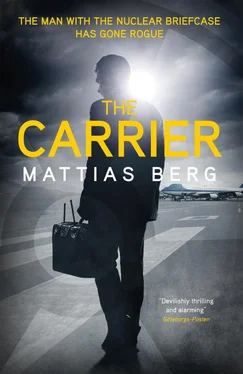Mattias Berg - The Carrier
Здесь есть возможность читать онлайн «Mattias Berg - The Carrier» весь текст электронной книги совершенно бесплатно (целиком полную версию без сокращений). В некоторых случаях можно слушать аудио, скачать через торрент в формате fb2 и присутствует краткое содержание. Город: London, Год выпуска: 2019, ISBN: 2019, Издательство: MacLehose Press, Жанр: Триллер, на английском языке. Описание произведения, (предисловие) а так же отзывы посетителей доступны на портале библиотеки ЛибКат.
- Название:The Carrier
- Автор:
- Издательство:MacLehose Press
- Жанр:
- Год:2019
- Город:London
- ISBN:978-0-85705-788-4
- Рейтинг книги:4 / 5. Голосов: 1
-
Избранное:Добавить в избранное
- Отзывы:
-
Ваша оценка:
- 80
- 1
- 2
- 3
- 4
- 5
The Carrier: краткое содержание, описание и аннотация
Предлагаем к чтению аннотацию, описание, краткое содержание или предисловие (зависит от того, что написал сам автор книги «The Carrier»). Если вы не нашли необходимую информацию о книге — напишите в комментариях, мы постараемся отыскать её.
The Carrier — читать онлайн бесплатно полную книгу (весь текст) целиком
Ниже представлен текст книги, разбитый по страницам. Система сохранения места последней прочитанной страницы, позволяет с удобством читать онлайн бесплатно книгу «The Carrier», без необходимости каждый раз заново искать на чём Вы остановились. Поставьте закладку, и сможете в любой момент перейти на страницу, на которой закончили чтение.
Интервал:
Закладка:
But come Stockholm, I had abandoned the analysis. There was only one way to clarify the situation, and that was empirically. At one particular place, and one only, on just one particular date. It was a guess. But an educated one.
After purchasing a night-train ticket costing an arm and a leg, I got some headache pills, water and a copy of the New York Times from a kiosk. There was still a quarter of an hour before departure, so I sat down among the businessmen who were smoking on the bench furthest along the platform, beyond the glow of the light. The newspaper was a day old: from December 11. I found what I was looking for, even though it had only been given one small square at the very bottom of the front page—so I leafed to the foreign pages and read on. The award of the Peace Prize in Oslo seemed once again to have passed without incident. And the views expressed about the Organization for Prohibition of Chemical Weapons were as effusive as ever.
Mobilizing public opinion against chemical weapons had been much more successful than in the case of nuclear weapons, since they never represented any direct threat to our own military power. Nerve gas had therefore already been banned long ago, even in wartime.
I laid the newspaper on the bench in order to take a few painkillers and rinse them down with the water. Only then did I catch sight of the article.
The entire top left-hand corner of the first page was covered with General Falconetti’s picture. Edelweiss’ most important playmate, in dress uniform, with a chest full of shining medals. A small column on the first page of the home news section listed all of Falconetti’s areas of responsibility: full operational charge of our nuclear weapons submarines, aircraft and land-based launch ramps. Highest supervisory authority over the military space program, as well as the entire digital war effort.
I pinched my arm and closed my eyes. But the article was still there when I opened them.
The most senior person responsible for the nuclear weapons system—at least officially, outside the Team, and therefore our nearest colleague—had been caught red-handed manipulating digital one-armed bandits.
A background article listed all the other incidents which had apparently come to light in the American nuclear weapons system during this fall alone. An entire unit of missile operators at the Malmstrom base had been failed during a security spot check, and the joint commander of two other unnamed nuclear weapons bases had recently been dismissed after similar controls.
In the article the Commander-in-chief talked of moral failings among personnel who had constantly to be at full readiness without ever being “deployed”, as he put it. A psychoanalyst agreed in an interview that people who are “deprived of purpose” in the end also lose their judgment.
At the foot of the page there was a timeline of the revelations. As I read it, I was stunned. Because it was not now—as news of this unthinkable incident was becoming public—that General Falconetti had been dismissed from the military.
It had happened on October 24. The day after Aina turned seventy, the attack during her birthday celebration, our escape from the window of the burning house. It could be a coincidence—but probably not.
4.03
I had been to Bruxelles-Central only once before. During an exercise in the heart of the city, simulating a terror attack, the President’s stand-in had taken shelter in the grand old station awaiting orders for evacuation. I had stood right next to him.
After sitting around in painful idleness, he had suggested we see who could be the quickest at counting the number of panes in the enormous barred windows running all the way from the doors of the front entrance up to the roof. I nodded: a stand-in should be obeyed in the same way as the President himself.
“231!” he said eagerly, after only about a second. He had obviously already counted them. “Simple mathematics. Seven sections times eleven rows times three panes in each!” he went on.
“Exactly,” I answered. “ Less the two missing panes at 3:7:2 and 5:2:1. So: 229 in total.”
It was because of those sorts of things that I had become the Carrier and he was still a stand-in. Because I—and not he—understood that the picture always consists of millions of pixels, that it is the details which define the whole rather than the other way around, his military career would always be stuck in amateur dramatics and party tricks.
Otherwise we usually arrived in Brussels directly with the helicopter, Marine One. Only Kurt-or-John and I, together with the President, and a few select members of his own security detail in a separate little group sitting furthest forward. We would land on the roof of the grayish and anonymous N.A.T.O. headquarters building, far enough away from the center along the motorway, then go straight into the office of the Supreme Allied Commander Europe while the guards gave even me subservient nods.
The latest Admiral was amiable and relaxed. Had taken up his post at the same time as the President and was about the same age—which meant they had more in common than just their jobs: they could loosen up with some banter before the agenda for the day took hold, about acquaintances shared, someone’s old girlfriend at university, the sports results. Occasionally about the nuclear football. Sometimes the President made as if to pass it to the Admiral, to take it out of my left hand and throw it across.
I had not moved a muscle, hardly even blinked. Through all these years.
During exercises we would instead land at and depart from the closed-off parts of Zaventem airport, called “Terminal X”. Enormous, fully armed columns for the regular joint maneuvers with our European allies. One of many full dress rehearsals, physical and psychological preparations for the unthinkable, with or without nuclear weapons.
But now I had come here to Belgium, a man without a briefcase or a weapon. I got onto a local train, picked a seat in the center of an empty carriage and took out the newspaper I had bought at the station kiosk. The clock at the first stop, Leuven, said 14.12. That vague time after lunch on a regular working day. A perfect moment to strike—or to be anonymous.
And there was at least as much in the Washington Post as there had been in the New York Times the day before, an entire spread. The headline read AMERICAN NUCLEAR WEAPONS SCANDAL, the layout unusually brash for the newspaper.
According to its so-called defense policy expert, astonishing new revelations were continuing to emerge from the nuclear weapons program. For example, the majority of the operative personnel at yet another of our most important missile bases—Minot—had been suspended for security reasons.
But the expert wrote that this was still small beer in comparison with the latest, as yet unconfirmed, rumor. That another of the three most senior officers responsible for the whole of the American nuclear weapons system had been suspended pending the outcome of an investigation. The main reason was said to be that he had behaved inappropriately at an international nuclear weapons conference, had become intoxicated and bragged about how he saves the world from destruction every day, each second, just by not pushing the button. He had also, in the course of the conference, ended up at the homes of a number of women with doubtful security status. “Like in a James Bond movie!”, the military political expert wrote.
I was not surprised: sooner or later our true personalities have a habit of emerging. And I had never had any time for General Goldsmith.
And yet—all this synchronicity. Everything coming out at once.
I stared out the window, trying to gather my thoughts. Sat bolt upright, so as not to let the raw parts of my back touch the seat.
Читать дальшеИнтервал:
Закладка:
Похожие книги на «The Carrier»
Представляем Вашему вниманию похожие книги на «The Carrier» списком для выбора. Мы отобрали схожую по названию и смыслу литературу в надежде предоставить читателям больше вариантов отыскать новые, интересные, ещё непрочитанные произведения.
Обсуждение, отзывы о книге «The Carrier» и просто собственные мнения читателей. Оставьте ваши комментарии, напишите, что Вы думаете о произведении, его смысле или главных героях. Укажите что конкретно понравилось, а что нет, и почему Вы так считаете.












